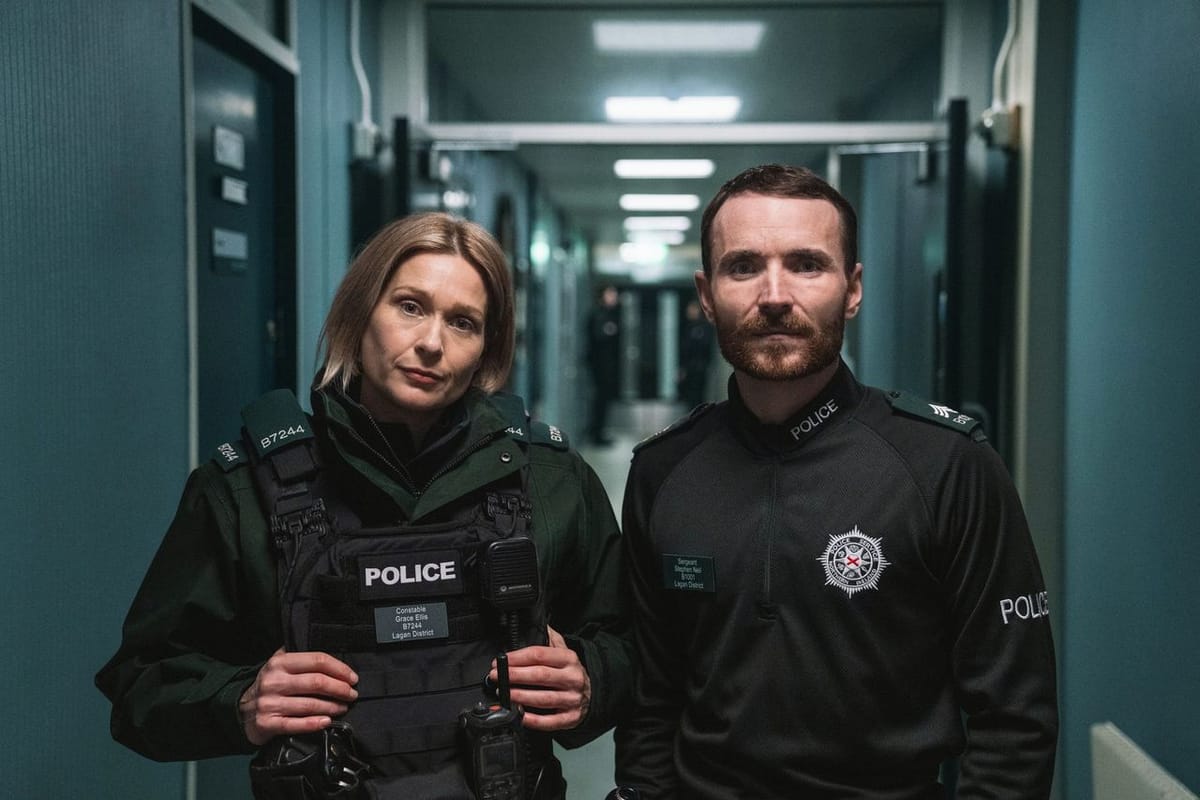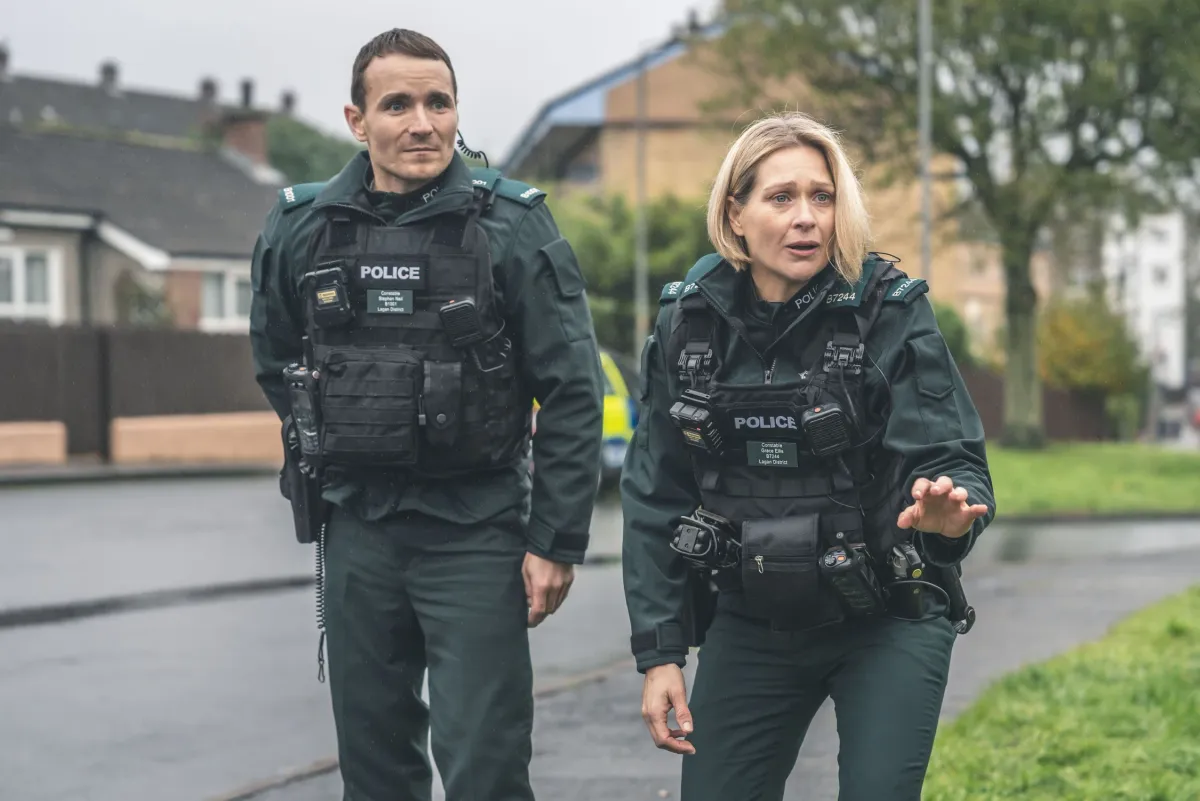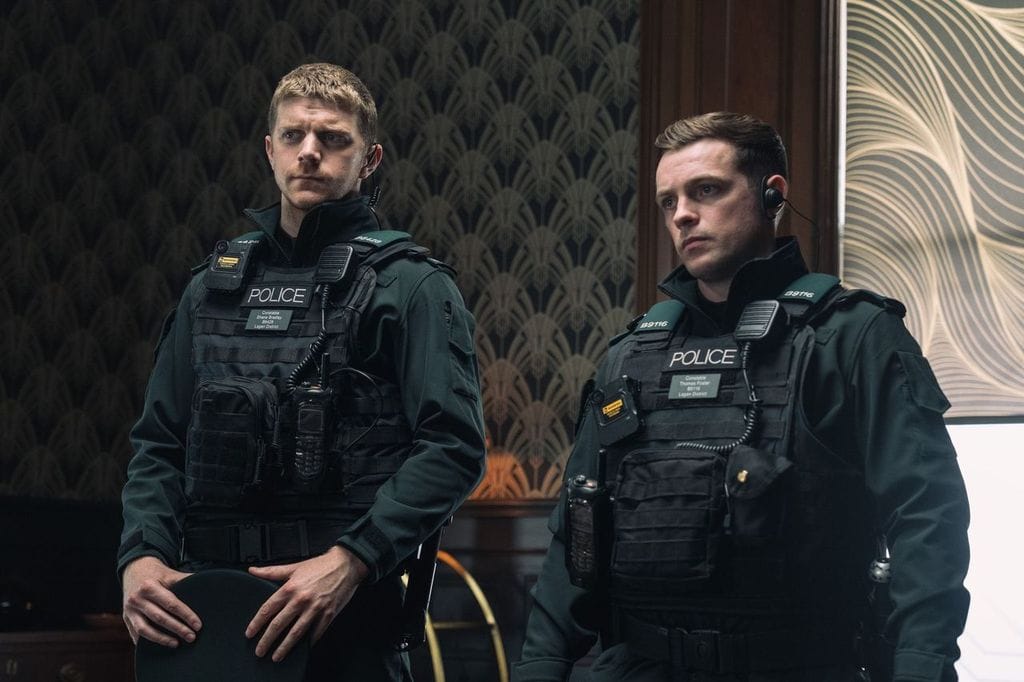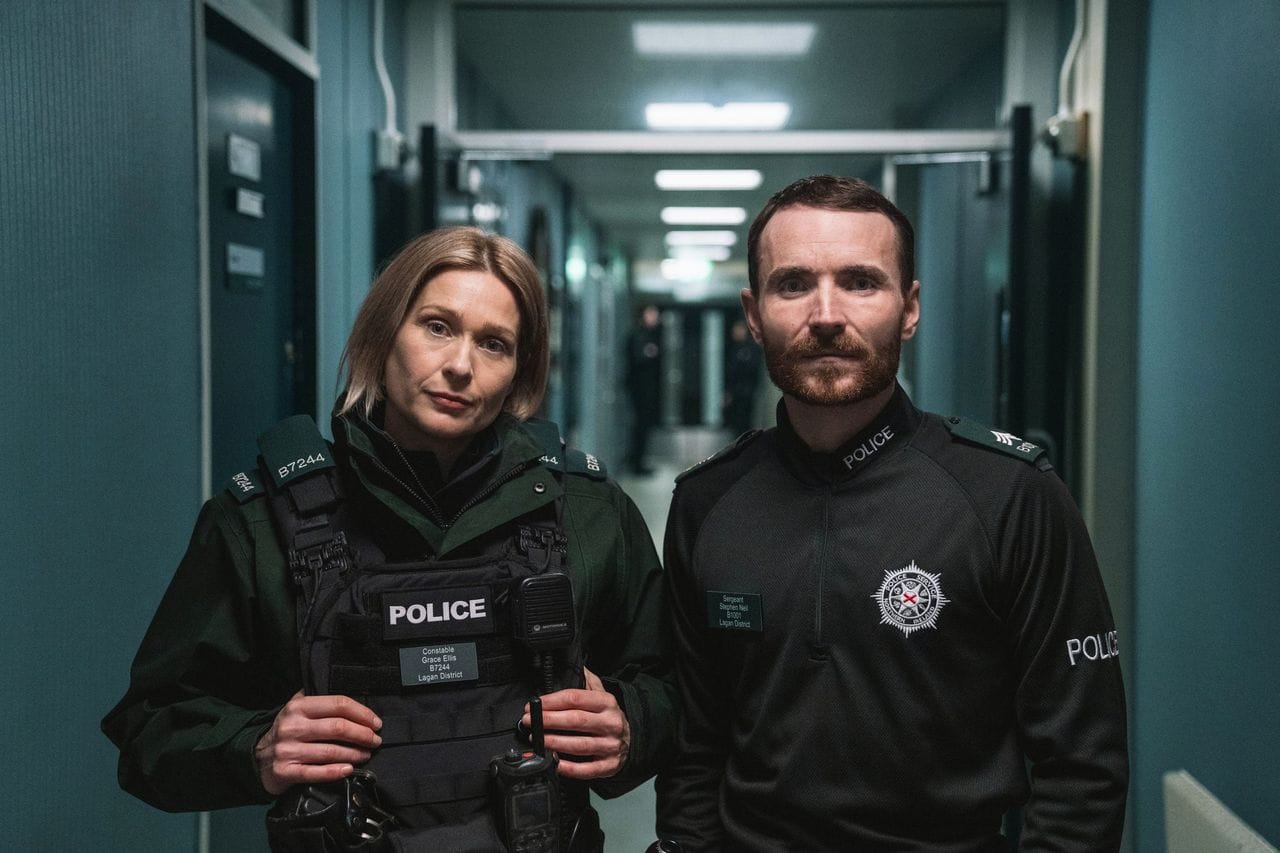"Blue Lights": Still A "Dirty Old Town"

"I heard a siren from the docks
Saw a train set the night on fire
I smelled the spring on the smoky wind
Dirty old town, dirty old town..."
The plaintive folk tune that spills out over the opening moments of every episode of “Blue Lights” sounds like an old Irish ballad. We watch from above as a squad car traces a path across a near-distance cityscape sprinkled with lights. Even as the siren slides like a penny whistle over the vocalist, the moment isn’t overly on the nose.
“Blue Lights” is smart that way; though the show’s needle drops veer towards country/Americana like “Help Me Make It Through the Night,” the soundtrack's artist performing “I Can’t Make You Love Me” is not Bonnie Raitt, bless her heart, but nonbinary Irish breakout who goes by SOAK.
In fact, “Dirty Old Town” was not born as an Irish ballad, though it might be heard from almost any bar band that ever hopped on a riser in an Irish pub. Its forensics include widely heard covers by everyone from The Dubliners to The Pogues, plus Rod Stewart, The Spinners, Steve Earle and more. It was actually written in 1946 by English folkie Ewan McColl about his own northern England factory town. As heard in the initial credits treatment here, from Irish finger-picking blues prodigy Muireann Bradley, it sashays forth like a wised-up Lily Allen track.
(For example: “Fuck You,” a slag of George W. Bush, later repurposed ton Allen's 2018 tour to aim at Trump. We won’t natter here about Ms. Allen’s public contretemps with her sometime companion, actor David Harbour. But please indulge us here, the ditty is simply too perfect for Trump:
Do you get, do you get little kick out of being small-minded?/
You want to be like your father, it's approval you're after
Well, that's not how you find it
Do you, do you really enjoy living a life that's so hateful?
'Cause there's a hole where your soul should be
You're losing control of it
And it's really distasteful
Onward to “Blue Lights,” Season 3 then. Please be notified that spoilers will follow, and if you’d like a less up-to-the-moment tip as to why to watch, please see my below post, as it dropped in July 2024, re the first two seasons, as it appeared on this blog in July of 2024:

As the “Dirty Old Town” words go darker—“I’ll chop you down like an old dead tree”—then fade, we find ourselves in the familiar setting of a squad car with dedicated “response” police officer Stevie, and his partner in anti-crime, Grace. They’re the beating heart—though sometimes succumbing to emotional arrhythmia—of this show through its eighteen episodes. We've watched Stevie insert himself—to her stern aggravation—into the dangerous situations they encountered. And further to that fan critique, as noted by Stevie in comparing the destination’s main crew to a dating app, the front-and-center core of cops (“peelers,” to the local haters) is rich both in beautiful local colleens and studly (if not always romantically puissant) males.
Stevie and Grace, then. No surprise that playing Stevie brought Belfast-raised actor Martin McCann a Best Actor nomination in the 2024 Irish Film and Television Awards. Stevie is brave but not stupid, ready to wrangle a knucklehead but just as ready to leap to the rescue of a local bloke set aflame in a riot. He’s the guy you want to marry your sister. He delivers both matey laugh lines and his more tender asides with formidable restraint. Sure, he could read the phone book incisively in a drama, but he won my wee* heart in his account, on a chat show of nurturing his Jack Russell terrier through a painful jaw condition.
*tele-tourism tip—almost everything in Belfast risks being `wee’, all the time.
Sian Brooke’s portrayal of Grace Ellis is as impressively rendered a display of womanly power as one could wish for. (It’s not for nothing she was handed the complex role—she’s been Juliet and Cordelia for the Royal Shakespeare Company, and the Royal Academy of Dramatic Arts graduate scored warm notices as Ophelia opposite Benedict Cumberbatch in the National Theater’s 2015 “Hamlet.”) Her resolute humanity mixed with daring shown on the mean semi-urban streets convinces you we did need another hero. That said, her dramaturgical superpower lies in Grace’s steady forbearance in her love life—though at times she gives way to sheer, irresistible affinity, even as she fights to give space to Stevie, for he has wounds still to bind from a lost partner.
Co-creator and co-showrunner Declan Lawn, who handles his press kit and interview opportunities with elan, has detailed how he and Brooke “meticulously” detailed her backstory in the early days of the run-up to Season 1. When Grace’s full unburdening comes late in Season 3, the authenticity is the magic trick. (At the same time, advancing a plot point became this show’s efficient storytelling, which speaks well of the entire creative team.) She muscles through a rediscovered memory with, er, grace and sheer believability, ultimately advising, “You can use the anger to break free.”
Whether or not the show wins another BAFTA—as Season 2 recently did—it would be a true crime if she’s not given special recognition. Some pushback met this third tranche; the Guardian’s TV reviewer provided himself what the peelers call a stab vest, carefully noting, “We still love `Blue Lights,’ ” but going on to cite Season 3 this way:“As viewers have got to know and like these people, the soppier character work has started to push the tough sectarian dynamics aside.”
Anyone lured this far into the post probably needs scant detail on the setup and scenario, but it’s a crime show with a difference. Like “The Wire”’s show creator David Simon, the Irish show runners were schooled near, and by, the very streets they depict. The tense and often intense series dramatizes the work and lives of a cohort of Northern Irish police who spend most of their shifts maintaining a fragile order on the streets of Belfast. As response officers plunged into a variety of urgent (if sometimes edgily comic) public and household crises as they criss-cross the Belfast map in boots and body armor, they are the thin line clad in ‘stab vests’, the Police Service of Northern Ireland.
The initial focus is on three probationary officers. Tommy is a fresh-faced, determined straight arrow in a profession that constantly tests his moral boundaries; Annie is a girl from a scenic if humble hamlet of the city outskirts, who signed on almost on a whim; and Grace is a mid-forties, sometime social worker who joined looking for a change but finds that the challenges steadily threaten to overwhelm the benefits.
They’ve got mentors. Tommy hits the streets with Gerry (pronounced Jerry) Cliff, a gruff, big-hearted law-enforcement veteran whose independent bent has kept him riding in a squad car rather than sticking in senior roles. Annie’s a classic beauty who often yields to a wry smirk that, for a while, keeps the rough-and-ready, been-there copper Shane Bradley off balance. And Grace is being trained up by Stevie, as each of them proves game for risky action and yet tender-hearted with the not -always -welcoming inhabitants of the districts they patrol. (Again, see the above link for more.)
Perhaps aware that we, regular viewers, are nearly able to finish sentences for this steadily entertaining crew, the creators have, with considerable craft, introduced new blood into the drama. We watch “Skipper”-level sergeant Helen McNally (as played by Joanne Crawford, capable, skeptical, and very much ' I-am-gay-and-what 's-it-to-ya?, finds herself tasked with an overambitious intelligence scheme, run by seasoned investigator Colly (a deft Michael Smiley). He’s the care-grizzled boomer so exhausted by antipathy toward the bad guys that his empathy toward his own kind is unraveling. “Time to put on the rucksack” of running covert ops, he avers, solemnly recruiting Helen, “Feel the weight of things you never wanted to know.”
Nor are the showrunners shy of new villains, as the show consciously shifts from the agonies of the dank streets, where drug territory is contested by old-school violence, to a subtler reign by professional-grade lawyers and accountants who can handle the new scale of drug running that starts across the coast in Latin America. The quietly unnerving queen bee is Cathy Tyson’s Dana Morgan, whose cold glares and cinched lips can’t quite daunt key confederate Donal Fogerty (Charlie Maher, properly one of the Irish Times’ “50 To Watch”) into adopting her cold-eyed lethality.
It's the kind of actor’s turn that might go unsung, as he vies to be the series’ most punchable face. Season 3 fully deploys the snotty (if at times simpering) drug task force boss Murray Canning. His prevarications enfold others, some more innocent than he, and you fervently hope someone will bloody his nose.
There are still more fully inhabited performances that mean this series will have a shot at next year’s BAFTA awards as well, and a run for Emmys would be highly justifiable.
In Northern Ireland, native son Declan Lawn has declared, there’s plenty of material to keep the seasons running up their awards tally: Loss and grief and violent death are integral to who we are.”
It may be a dirty old town, but here’s the craic, as the Irish seem to name their joys– it’s such a watchable one.





Comments ()